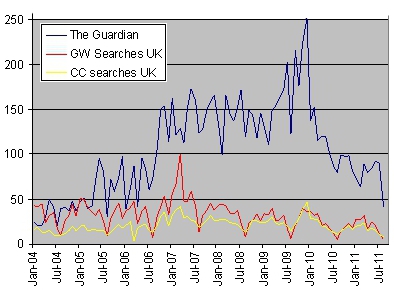
March 2, 2012, by Brigitte Nerlich
Climategate, media volume and public concerns – what’s the relation?
In my last blog I promised some further discussion of the link between media volume and public concern about climate change. This is what today’s blog is about, based on some work I carried out with a former MA student, Alan Valdez.
Discussions about the agenda-setting power of the media, particularly in the context of Climate Change, tend to make one of two equally dubious assumptions: (1) that news-media are all-powerful, at least when it comes to swaying public opinion one way or another, and (2) that large media organizations have perfect knowledge about the tastes and interests of their public and are ever willing to give the public what it wants.
Media coverage as a barometer of public interest
Both assumptions can lead to a situation in which media coverage of a given subject is seen as a reliable barometer of public interest on the topic. This seems to be confirmed (at least in part) by previous studies that have found some correlation between media coverage of climate change and public interest as measured by instruments such as the Gallup poll.
Using a different barometer
We have recently taken an interest in using a different barometer for assessing public interest in climate change. It is very easy to fall into the temptation of idealizing oneself at the moment of answering a questionnaire. While it has been well established that more people declare themselves to be concerned about climate change when climate change has been discussed in the news, it remains to be seen whether that concern is sincere and pressing enough to translate into action. In our research, we decided to explore the co-relation (or lack thereof), of media coverage and action, taking a certain action that is very specific, simple, inexpensive, easy to perform and easy to measure as an indicator: Online search.
Search patterns
Insight for Search – a Google tool that analyzes trends in search queries through reports on popular queries in different countries, provided ready access to search patterns on both sides of the Atlantic. Comparison of these trends with article counts for agenda-setting newspapers (e.g, The Guardian, The New York Times) illustrated some fascinating commonalities and divergences on British and American perceptions of global warming and climate change. For the purposes of this blog post we will focus on exploring the question that started it all: Will an increase in media interest (as measured by article counts) translate into increased public interest (as measured by web search volume)?
The chart above suggests that the answer is “no”, at least in the case of the British public. Or more specifically, we can find a more than passing resemblance between The Guardian’s coverage of climate change and the tale of the boy who cried wolf. The blue line in the chart provides a count of articles dealing with global warming and climate change published by The Guardian on a given month. The line in red represents the relative popularity of the term ‘global warming’ within the UK, and the yellow line represents the relative popularity of the term ‘climate change’.
What’s the story?
This sparse graph tells a clear story: Press coverage related to climate change peaked in late 2006 following a series of prominent announcements and events. This was matched by a peak in public interest (as measured by web search volume) in early 2007. However, the relation between public and media interest did not persist over time. Although the count of articles related to climate change and global warming remained high for almost two years, public interest waned almost immediately. 2009 provided a second opportunity to observe the interaction between media coverage and search activity. Surprisingly, the media outpouring surrounding the Copenhagen summit and climategate had no discernible effect on searches for ‘global warming’, while in the case of ‘climate change’ the ensuing spike was followed by the lowest levels of public interest since 2004. Increased media coverage certainly produced increased public interest on the subject of climate change…But there is a caveat: Just once, and just for a few months.
You can read more about this research in the June issue of People & Science.
Alan Miguel Valdez (Open University) and Brigitte Nerlich (University of Nottingham)


[…] is a follow-up to a guest-blog on climategate, media volume and public concern. As last time, this blog was written by Alan Valdez (The Open University) in collaboration with […]
[…] one on the shift from (verbal) carbon compounds to energy compounds and one on why turning up the media volume on climate change may turn people off. This research is linked to a project funded by the ESRC/ORA […]
[…] change between Hurricane Katrina and Hurricane Sandy, or this post about the relation between media volume and public concern about climate change. For more information on articles dealing with various aspects of climate change in the public […]
[…] Climategate media volume and public concerns – 2012/03/02 […]
[…] Climategate […]